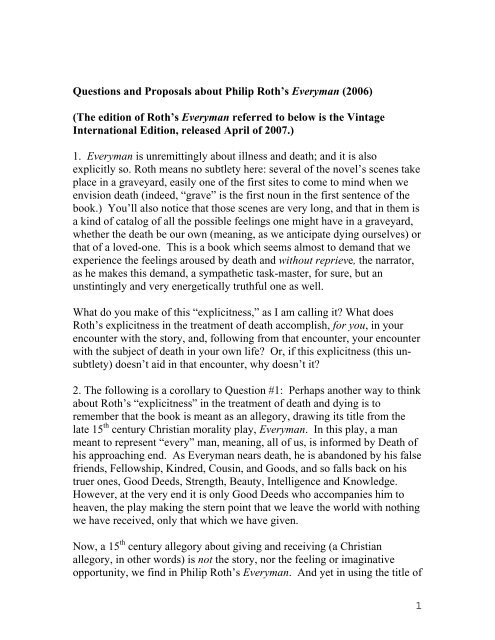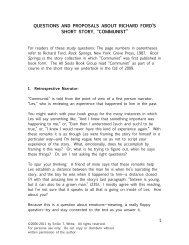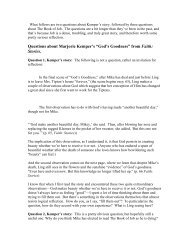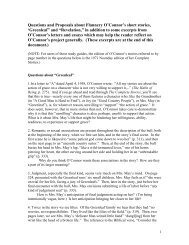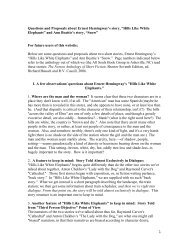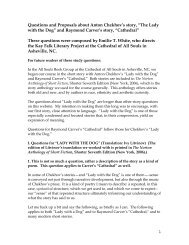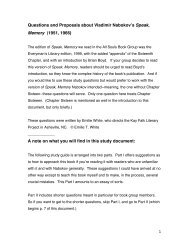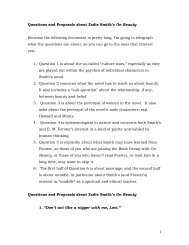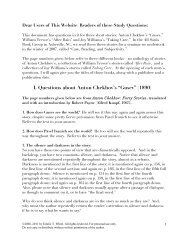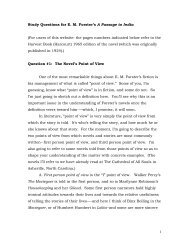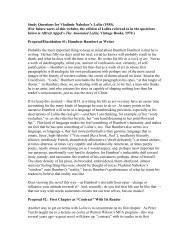1 Questions and Proposals about Philip Roth's Everyman (2006 ...
1 Questions and Proposals about Philip Roth's Everyman (2006 ...
1 Questions and Proposals about Philip Roth's Everyman (2006 ...
Create successful ePaper yourself
Turn your PDF publications into a flip-book with our unique Google optimized e-Paper software.
<strong>Questions</strong> <strong>and</strong> <strong>Proposals</strong> <strong>about</strong> <strong>Philip</strong> Roth’s <strong>Everyman</strong> (<strong>2006</strong>)(The edition of Roth’s <strong>Everyman</strong> referred to below is the VintageInternational Edition, released April of 2007.)1. <strong>Everyman</strong> is unremittingly <strong>about</strong> illness <strong>and</strong> death; <strong>and</strong> it is alsoexplicitly so. Roth means no subtlety here: several of the novel’s scenes takeplace in a graveyard, easily one of the first sites to come to mind when weenvision death (indeed, “grave” is the first noun in the first sentence of thebook.) You’ll also notice that those scenes are very long, <strong>and</strong> that in them isa kind of catalog of all the possible feelings one might have in a graveyard,whether the death be our own (meaning, as we anticipate dying ourselves) orthat of a loved-one. This is a book which seems almost to dem<strong>and</strong> that weexperience the feelings aroused by death <strong>and</strong> without reprieve, the narrator,as he makes this dem<strong>and</strong>, a sympathetic task-master, for sure, but anunstintingly <strong>and</strong> very energetically truthful one as well.What do you make of this “explicitness,” as I am calling it? What doesRoth’s explicitness in the treatment of death accomplish, for you, in yourencounter with the story, <strong>and</strong>, following from that encounter, your encounterwith the subject of death in your own life? Or, if this explicitness (this unsubtlety)doesn’t aid in that encounter, why doesn’t it?2. The following is a corollary to Question #1: Perhaps another way to think<strong>about</strong> Roth’s “explicitness” in the treatment of death <strong>and</strong> dying is toremember that the book is meant as an allegory, drawing its title from thelate 15 th century Christian morality play, <strong>Everyman</strong>. In this play, a manmeant to represent “every” man, meaning, all of us, is informed by Death ofhis approaching end. As <strong>Everyman</strong> nears death, he is ab<strong>and</strong>oned by his falsefriends, Fellowship, Kindred, Cousin, <strong>and</strong> Goods, <strong>and</strong> so falls back on histruer ones, Good Deeds, Strength, Beauty, Intelligence <strong>and</strong> Knowledge.However, at the very end it is only Good Deeds who accompanies him toheaven, the play making the stern point that we leave the world with nothingwe have received, only that which we have given.Now, a 15 th century allegory <strong>about</strong> giving <strong>and</strong> receiving (a Christianallegory, in other words) is not the story, nor the feeling or imaginativeopportunity, we find in <strong>Philip</strong> Roth’s <strong>Everyman</strong>. And yet in using the title of1
6. This is not a theistic story, at least not in any way I can see. On the otherh<strong>and</strong>, I wouldn’t necessarily call it an a-theistic story, only because thequestion of Belief versus Non-Belief doesn’t seem the agenda either of theprotagonist or his author. Rather, the interest here seems emphatically amaterialistic one, the novel staking its faith first to last in the bodily, theearthly, the concrete. For the protagonist, <strong>and</strong> perhaps for the novelgenerally, “There was only our bodies, born to live <strong>and</strong> die on terms decidedby the bodies that had lived <strong>and</strong> died before us. If he [the protagonist] couldbe said to have located a philosophical niche for himself, that was it—-he’dcome upon it early <strong>and</strong> intuitively, <strong>and</strong> however elemental, that was thewhole of it.” (p. 52).If the novel’s materialism, as I am calling it, is for you one of its strengths—-if it has something to offer you--how is it a strength, what does it offer?And if the novel’s materialism is for you a weakness, how is it a weakness?4


